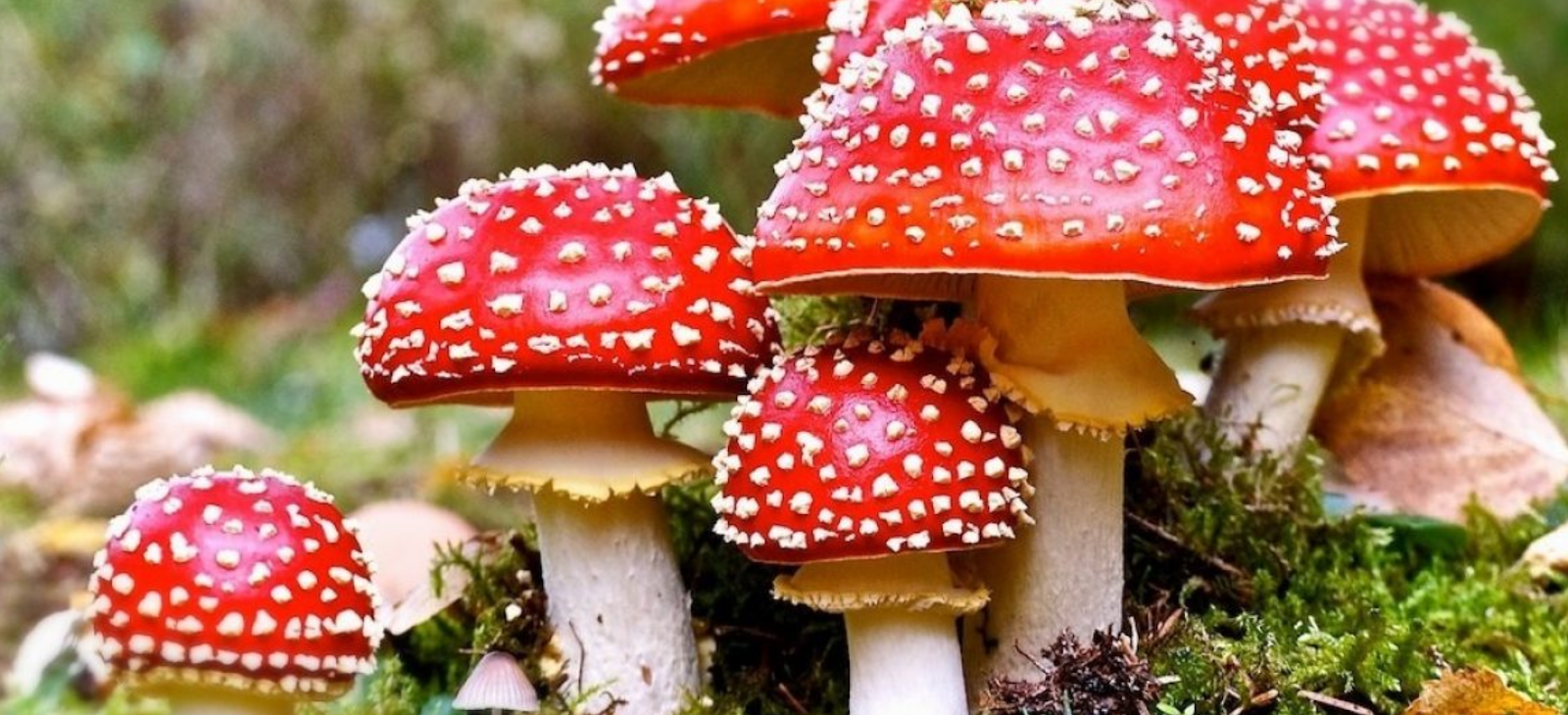Is Amanita Muscaria Safe for Pets
- Al Nicola
- April 8, 2023
- 9:39 pm

As a pet owner, you want to make sure that your animal friend is secure at all times. If you are considering using Amanita Muscaria for its medicinal or recreational purposes, you may be wondering whether this natural substance is safe for pets. In this article, we will explore the safety of Amanita Muscaria for pets and provide you with important information that can help you make an informed decision.
What is Amanita Muscaria?
Amanita Muscaria, also known as the fly agaric mushroom, is a type of mushroom that grows in Europe, Asia, and North America. This mushroom has a distinctive red cap with white spots and is often associated with magic and folklore.
Amanita Muscaria is also recognized for its potential toxicity, particularly when ingested in high amounts. This mushroom is hazardous because of the multiple poisons that are included in its chemical makeup, including ibotenic acid and muscimol. These toxic compounds can have a variety of moderate to severe effects on animals as well as people, including hallucinations, nausea, diarrhea, and even death.
Amanita Muscaria is still utilized in some traditional treatments and spiritual rituals despite the fact that it may be harmful. To prevent any potential health hazards, it is crucial to use this mushroom with caution and seek expert advice.
Is Amanita Muscaria safe for pets?
The short answer is NO. Research suggests that Amanita Muscaria is toxic to animals and can cause serious health problems or even death if ingested. This mushroom contains several toxins, including ibotenic acid and muscimol, which can cause a range of symptoms in pets.
Symptoms of Amanita Muscaria Poisoning in Pets
When a pet ingests Amanita Muscaria, it can cause various symptoms that can be indicative of toxicity. Some of the most common symptoms that pets can experience after consuming Amanita Muscaria include vomiting, which can be persistent, diarrhea, and abdominal pain. Additionally, the affected pet may exhibit drooling, a reduction in energy levels, and a lack of coordination, also known as ataxia.
Furthermore, muscle tremors are a frequent symptom associated with Amanita Muscaria toxicity in pets. The severity of these tremors can vary, ranging from mild and occasional to severe and frequent. Seizures are also a possible symptom, and it is essential to seek veterinary care immediately if a pet experiences one or more seizures after ingesting Amanita Muscaria.
In some cases, Amanita Muscaria toxicity can result in the affected pet falling into a coma. This is a serious and life-threatening symptom that requires immediate veterinary attention. In severe cases, Amanita Muscaria toxicity can also be fatal for pets, making it crucial to prevent your pets from consuming this mushroom.
It is important to note that a multitude of factors, including the quantity of Amanita Muscaria eaten, the size and age of the pet, and any underlying medical issues, might affect how severe the symptoms are. Hence, even if your pet is not displaying any symptoms, it is still advised to seek veterinarian attention as soon as possible if you believe that they have swallowed Amanita Muscaria.
What to do if your pet ingests Amanita Muscaria?
You should act swiftly and seek veterinary attention right away if you think your pet may have consumed Amanita muscaria. In these situations, time is critical. The sooner you seek professional help, the greater the likelihood that your pet will make a full recovery.
Your veterinarian may induce vomiting or perform gastric lavage to remove any remaining mushroom material from your pet’s stomach. They may also administer activated charcoal or other medications to help absorb any remaining toxins in your pet’s system.
Even if your pet feels good after eating Amanita Muscaria, you should take them to the vet nevertheless. As previously said, a number of variables, including as your pet’s size, the quantity of Amanita Muscaria they consumed, and any underlying medical concerns they might have, might affect how severe the symptoms are.
In severe cases, Amanita Muscaria toxicity can be fatal for pets, making it crucial to prevent them from consuming this mushroom in the first place. Therefore, it is essential to take action as a responsible pet owner to keep your furry companion safe and away from this fungus.
Preventing Amanita Muscaria Toxicity in Pets
As we already mentioned Amanita Muscaria is a potentially toxic mushroom for pets if ingested. To avoid any potential health hazards, it is crucial that you take action as a responsible pet owner to keep your four-legged friend from getting in touch with this fungus. Here are some things you may take to guard against this mushroom poisoning your animal friend:
- Know the appearance of Amanita Muscaria: Learn how to recognize this mushroom so you can spot it if it appears in your garden or during your walks. Amanita Muscaria has a red cap with white spots and a stalk that is white or yellow.
- Keep your yard clean: Remove any Amanita Muscaria mushrooms that may be growing in your yard promptly. You can do this by wearing gloves and using a plastic bag to remove the mushroom, including the root.
- Walk your pet on a leash: Keep your pet on a leash and under your supervision during walks, especially in areas where Amanita Muscaria may grow, such as wooded areas or near trees.
- Train your pet: Train your pet not to eat anything off the ground while on walks or in the yard. This can be done through positive reinforcement training and keeping them occupied with toys and treats.
- Get in touch with your vet: Call your veterinarian immediately if you think your pet may have consumed Amanita muscaria. Toxic effects can cause vomiting, diarrhea, stomach discomfort, drowsiness, and seizures, which can range in severity from moderate to severe.
The Bottom Line
Amanita Muscaria is not safe for pets and can cause serious health problems or even death if ingested. Pet owners should take proactive steps to prevent their pets from being exposed to this toxic mushroom by learning to recognize its appearance, keeping their yard clean, and proper training and monitoring of their pets.
While Amanita Muscaria is still used in some traditional treatments and spiritual rituals, it is crucial to use this mushroom with caution and seek expert advice to prevent any potential health hazards. As responsible pet owners, it’s our duty to ensure our furry friends’ safety & well-being by taking necessary precautions to protect them from harm.
Is Amanita Muscaria Safe for Pets
As a pet owner, you want to make sure that your animal friend is secure at all times. If you are considering using Amanita Muscaria for its medicinal or recreational purposes, you may be wondering whether this natural substance is safe for pets. In this article, we will explore the safety of Amanita Muscaria for pets and provide you with important information that can help you make an informed decision.
What is Amanita Muscaria?
Amanita Muscaria, also known as the fly agaric mushroom, is a type of mushroom that grows in Europe, Asia, and North America. This mushroom has a distinctive red cap with white spots and is often associated with magic and folklore.
Amanita Muscaria is also recognized for its potential toxicity, particularly when ingested in high amounts. This mushroom is hazardous because of the multiple poisons that are included in its chemical makeup, including ibotenic acid and muscimol. These toxic compounds can have a variety of moderate to severe effects on animals as well as people, including hallucinations, nausea, diarrhea, and even death.
Amanita Muscaria is still utilized in some traditional treatments and spiritual rituals despite the fact that it may be harmful. To prevent any potential health hazards, it is crucial to use this mushroom with caution and seek expert advice.
Is Amanita Muscaria safe for pets?
The short answer is NO. Research suggests that Amanita Muscaria is toxic to animals and can cause serious health problems or even death if ingested. This mushroom contains several toxins, including ibotenic acid and muscimol, which can cause a range of symptoms in pets.
Symptoms of Amanita Muscaria Poisoning in Pets
When a pet ingests Amanita Muscaria, it can cause various symptoms that can be indicative of toxicity. Some of the most common symptoms that pets can experience after consuming Amanita Muscaria include vomiting, which can be persistent, diarrhea, and abdominal pain. Additionally, the affected pet may exhibit drooling, a reduction in energy levels, and a lack of coordination, also known as ataxia.
Furthermore, muscle tremors are a frequent symptom associated with Amanita Muscaria toxicity in pets. The severity of these tremors can vary, ranging from mild and occasional to severe and frequent. Seizures are also a possible symptom, and it is essential to seek veterinary care immediately if a pet experiences one or more seizures after ingesting Amanita Muscaria.
In some cases, Amanita Muscaria toxicity can result in the affected pet falling into a coma. This is a serious and life-threatening symptom that requires immediate veterinary attention. In severe cases, Amanita Muscaria toxicity can also be fatal for pets, making it crucial to prevent your pets from consuming this mushroom.
It is important to note that a multitude of factors, including the quantity of Amanita Muscaria eaten, the size and age of the pet, and any underlying medical issues, might affect how severe the symptoms are. Hence, even if your pet is not displaying any symptoms, it is still advised to seek veterinarian attention as soon as possible if you believe that they have swallowed Amanita Muscaria.
What to do if your pet ingests Amanita Muscaria?
You should act swiftly and seek veterinary attention right away if you think your pet may have consumed Amanita muscaria. In these situations, time is critical. The sooner you seek professional help, the greater the likelihood that your pet will make a full recovery.
Your veterinarian may induce vomiting or perform gastric lavage to remove any remaining mushroom material from your pet’s stomach. They may also administer activated charcoal or other medications to help absorb any remaining toxins in your pet’s system.
Even if your pet feels good after eating Amanita Muscaria, you should take them to the vet nevertheless. As previously said, a number of variables, including as your pet’s size, the quantity of Amanita Muscaria they consumed, and any underlying medical concerns they might have, might affect how severe the symptoms are.
In severe cases, Amanita Muscaria toxicity can be fatal for pets, making it crucial to prevent them from consuming this mushroom in the first place. Therefore, it is essential to take action as a responsible pet owner to keep your furry companion safe and away from this fungus.
Preventing Amanita Muscaria Toxicity in Pets
As we already mentioned Amanita Muscaria is a potentially toxic mushroom for pets if ingested. To avoid any potential health hazards, it is crucial that you take action as a responsible pet owner to keep your four-legged friend from getting in touch with this fungus. Here are some things you may take to guard against this mushroom poisoning your animal friend:
- Know the appearance of Amanita Muscaria: Learn how to recognize this mushroom so you can spot it if it appears in your garden or during your walks. Amanita Muscaria has a red cap with white spots and a stalk that is white or yellow.
- Keep your yard clean: Remove any Amanita Muscaria mushrooms that may be growing in your yard promptly. You can do this by wearing gloves and using a plastic bag to remove the mushroom, including the root.
- Walk your pet on a leash: Keep your pet on a leash and under your supervision during walks, especially in areas where Amanita Muscaria may grow, such as wooded areas or near trees.
- Train your pet: Train your pet not to eat anything off the ground while on walks or in the yard. This can be done through positive reinforcement training and keeping them occupied with toys and treats.
- Get in touch with your vet: Call your veterinarian immediately if you think your pet may have consumed Amanita muscaria. Toxic effects can cause vomiting, diarrhea, stomach discomfort, drowsiness, and seizures, which can range in severity from moderate to severe.
The Bottom Line
Amanita Muscaria is not safe for pets and can cause serious health problems or even death if ingested. Pet owners should take proactive steps to prevent their pets from being exposed to this toxic mushroom by learning to recognize its appearance, keeping their yard clean, and proper training and monitoring of their pets.
While Amanita Muscaria is still used in some traditional treatments and spiritual rituals, it is crucial to use this mushroom with caution and seek expert advice to prevent any potential health hazards. As responsible pet owners, it’s our duty to ensure our furry friends’ safety & well-being by taking necessary precautions to protect them from harm.

